
by Jennifer Burden | Mar 28, 2014 | 2014, Poverty, Video
This week I joined a group of World Moms Blog contributors who have been trying to live on $1.50 a day for 1 day. One day, turned into the full 5 day challenge for me, and today, Day 5, wasn’t what I expected:
Look out for our collaborative World Moms Blog post on the Live Below the Line Challenge with the Global Poverty Project coming soon…
Click to find out how to donate to UNICEF on behalf of Live Below the Line. Every dollar counts.
This is an original post to World Moms Blog by founder, Jennifer Burden, of NJ, USA.

Jennifer Burden is the Founder and CEO of World Moms Network, an award winning website on global motherhood, culture, human rights and social good. World Moms Network writes from over 30 countries, has over 70 contributors and was listed by Forbes as one of the “Best 100 Websites for Women”, named a “must read” by The New York Times, and was recommended by The Times of India.
She was also invited to Uganda to view UNICEF’s family health programs with Shot@Life and was previously named a “Global Influencer Fellow” and “Social Media Fellow” by the UN Foundation. Jennifer was invited to the White House twice, including as a nominated "Changemaker" for the State of the World Women Summit. She also participated in the One Campaign’s first AYA Summit on the topic of women and girl empowerment and organized and spoke on an international panel at the World Bank in Washington, DC on the importance of a universal education for all girls. Her writing has been featured by Baby Center, Huffington Post, ONE.org, the UN Foundation’s Shot@Life, and The Gates Foundation’s “Impatient Optimists.” She is currently a candidate in Columbia University's School of International and Public Affairs in the Executive Masters of Public Affairs program, where she hopes to further her study of global policies affecting women and girls.
Jennifer can be found on Twitter @JenniferBurden.
More Posts - Website
Follow Me:


by ThinkSayBe | Mar 28, 2014 | 2014, Africa, Communication, Cultural Differences, Culture, Economy, International, Language, Life Lesson, Poverty, Travel, Vacationing, World Motherhood
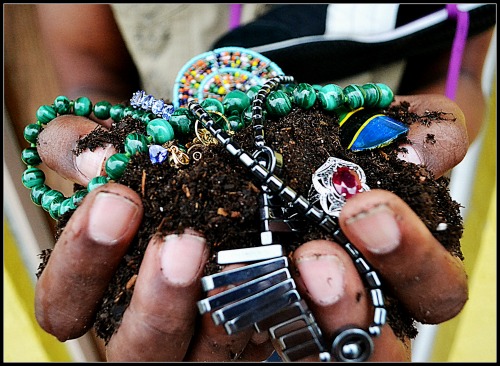 “Hey bro, vipi? How much for these shoes?” I ask the second-hand market vendor.
“Hey bro, vipi? How much for these shoes?” I ask the second-hand market vendor.
“Ah! Those, for you, those are $30 U.S.dollars,” he responds with a tone indicating that he’s giving me a deal. He didn’t know I was Tanzanian, maybe because I hadn’t yet spoken more than a few words in Kiswahili. Words that any foreigner who cared to find out would have known.
“$30?! I can get a new pair of shoes in the U.S. for that amount!” I say in return, flabbergasted by the price this man just gave me.
After a few minutes of haggling, going back and forth about the quality of the shoes, and his realization of my nationality, we do not close the sale of these shoes, but commence having a very important conversation about the poverty of Africa.
I will call this man Peter, as I do not recall his name.
As I talked down the price of the shoes, Peter said things like, “You people have money!” and “Come on, you can pay this amount easily.”
When Peter and I started talking (immediately after I decided not to purchase the shoes), I asked him his reasons behind hiking prices up so high for foreigners. He simply said, “Because we are poor here in Tanzania, and in Africa, so I have to try to earn money some way, and you guests have the money.” (more…)
I am a mom amongst some other titles life has fortunately given me. I love photography & the reward of someone being really happy about a photo I took of her/him. I work, I study, I try to pay attention to life. I like writing. I don't understand many things...especially why humans treat each other & other living & inanimate things so vilely sometimes. I like to be an idealist, but when most fails, I do my best to not be a pessimist: Life itself is entirely too beautiful, amazing & inspiring to forget that it is!
More Posts
Follow Me:


by Jennifer Burden | Mar 26, 2014 | 2014, Poverty, World Moms Blog, World Voice

A few months ago, the Live Below the Line of Poverty Challenge contacted World Moms Blog to ask if any of our contributors would like to take their challenge — 5 days of living on $1.50 per day.
According to the World Bank, there are over 1.2 billion people living below the line of extreme poverty in the world, which is defined as living on below $1.25 per day. The Global Poverty Project is challenging everyone to live on $1.50 per day to advocate for the world’s poorest. They state,
“We run Live Below the Line because we believe to really fight poverty, we’ve got to better understand it.”
Well, I had no idea what I was getting into. When the request came around cheerleaded by World Moms Blog Senior Editor, Elizabeth Atalay of Documama, I joined in because some of our contributors REALLY wanted to do this. I remember my friend, Holly Pavlika of MOMentum Nation, completing the challenge several years ago before she left for Tanzania with Shot@Life. We were at a lunch for a Shot@Life Champion event in NYC, and she declined her lunch and chose to eat 2 boiled eggs instead. I, on the other hand, chose the salmon and asked if I could sneak her some. She explained that she wasn’t allowed to take hand outs on the challenge. I was intrigued…
So when the request to live on $1.50 a day came around, I said, “I’ll do it, but just for one day, not five.” Well, here I am on Day 3…
World Moms Blog Editor, Hannah Ashton, suggested that we pool our resources, my $7.50 for 5 days and her $7.50 for 5 days. The plan was that amount would buy enough food for 5 days, and then for the one day of our challenge we would eat a fifth of the food.
My rations included 1 bag of beans, 2 cups of white rice, 2 cups of flour, 1 small bag of carrots, 3 bananas, 5 packs of instant oatmeal with dried apples and cinnamon, 1 jar of tomato sauce, some green tea bags and two onions. We had 12 cents left over each, so we justified a pinch of salt and a tiny bit of oil from our kitchens.
I’ve been sharing my experience on my personal Facebook Page, and I’m going to show you what happened:
Live Below the Line Day 1
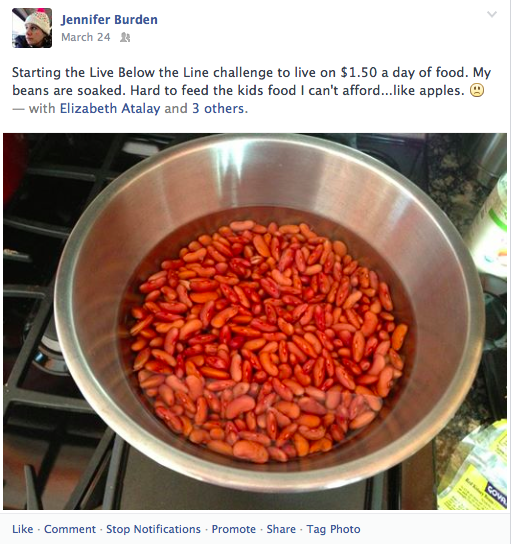
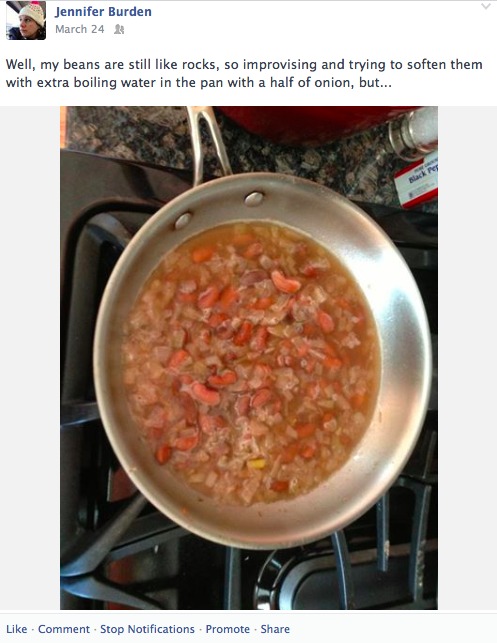
I had two portions of the beans and onions over rice, thinking that I could “anchor” my stomach by filling it. That evening, I had tea and a banana for dinner. But, I was so hungry when I went to bed.
Live Below the Line Day 2
The next morning I woke up, and realized that there is actually a lot of things I do for my kids in the morning, including making their breakfast, before I had mine. I was feeling really hungry while running around and getting the laundry started. When I finally made my way to the kitchen, I realized that my oldest daughter had eaten one of my banana rations. I stopped short.
“Noooooooo!!”, I thought.
But, that’s the point where the transformation began for me. It wasn’t just about feeling hungry, I began to think differently.
“So, this is how it feels for a mom living in poverty?” Her child is hungry, and so is she. I left the banana out within reach, so there was no time to cut and share it.
Next, I made my instant oats with boiled water. My children both wanted to try it. At home, they are used to oatmeal that we mix with flax-seed and a little mini chocolate chips to sweeten the deal with some milk. (For me on the challenge, the flax-seed, chocolate chips and milk were too luxurious today.) So, they were curious. I shared, although my stomach was growling, and since they weren’t doing the challenge, I thought I could direct them to their lovely 5 grain bread and melon. But, I thought, “Ok, keep it real. What would a mother in this situation have to do?” I let them try the oatmeal. They didn’t like it. Relief. I gobbled it up.
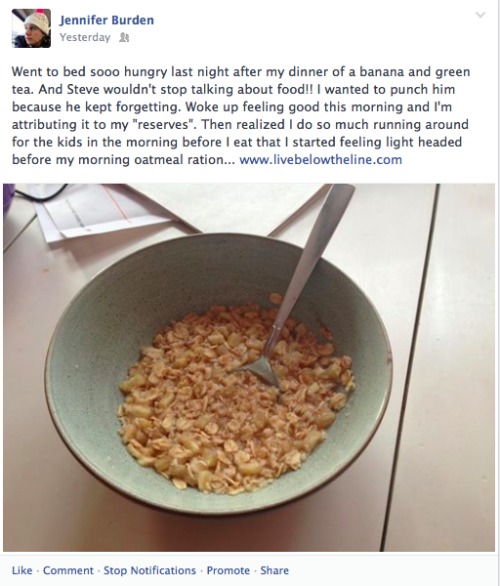
Ok, so I was joking. I really didn’t want to punch Steve, but you know what I mean! He actually wanted to join the challenge at the last-minute, but I told him that I only had rations for one. Maybe the idea was in my head that this could continue? In the meantime, I had to deal with him eating gourmet pizza, while I was chomping on beans.
So, at this point, I thought, “I’ll do it up through dinner. I’m hosting book club tonight, and there’s noooo way, I will be able to get through not snacking with my friends. Book Club is more like “Eat Club”. I was pretty sure that’s where my journey ended. Hey, that’s nearly a full day past what I said I’d do, right? But, I guess something in me didn’t want to stop, so I put the request out, “Do you think I should continue?”
One of my friends suggested that she thought I could do it, but why would I want to?? Her question was a pivotal part in my journey. The challenge was taking a new role. I spent the morning reflecting:
“I’m understanding in more detail things I have already learned, such as how during a trip to Uganda with the Shot@Life campaign, we learned that if a father bought a soft drink, that expense meant the family may go hungry. Last night I was just annoyed that my husband mentioned food. How would I have reacted if I was a mother in the situation with the soft drink in places in Uganda?? I’m understanding by feeling instead of just reading and seeing. The places this experience is taking my mind and my senses is what is keeping me going to want to learn more. I may never know what it’s like to live in extreme poverty, but this challenge is reminding me on another level of why eradicating extreme poverty should be a human priority.
Right now, it’s getting through it and feeling everything, then it will be, “What can I do about it?”.
Live Below the Line Day 3…
So, last night, I made it through Book Club. I had beans with onions and tomato sauce over rice for lunch and dinner. I was too hungry to snap a picture beforehand. I had my dinner later in the day, so I wasn’t hungry in the evening when all of the food was out. My friends were really supportive, nobody held me down and pushed guacamole down my mouth. They had a lot of questions, too.
It wasn’t until my friends left that I began to feel the hunger pangs. I quickly put everything away and left the dishes for the morning. I went to bed last night thinking, “How do people who make very little money in food service get through their day among all the food?”
The ability to understand advocacy on another level — feeling — is what has brought me to day 3 of what was supposed to be only a 1 day project.
I plan to continue to Friday for the full 5 day challenge, and also look out for an article about all the World Moms Blog contributors who are taking the challenge with Deborah Quinn from MannaHattaMamma in the UAE; Hannah Ashton, Elizabeth Atalay of Documama, and Polish Mom Photographer in the USA; Alison Fraser of Mom2Mom Africa in Canada; and Purnima Ramakrishnan of The Alchemist’s Blog in India. I’m curious to hear how the challenge went for them!
World Moms Blog wasn’t expecting to fundraise for the challenge, but after requests from friends on Facebook, we have created a World Moms Blog donation page on the Live Below the Line site. Donations made to our page there will benefit UNICEF, an organization whose great work I observed in Uganda with the Shot@Life campaign.
Want to have an in-body experience to help the world’s 1.2 billion living below the poverty line? How about joining the Live Below the Line challenge, too? Plan now to start between April 28th and May 2nd. There are site challenges in the US, UK, Australia, New Zealand, Canada and Colombia.
You can help the World Moms Blog contributors with their challenge. Share this post to help us spread the word about our Live Below the Line challenge!
This is an original post to World Moms Blog by founder, Jennifer Burden in NJ, USA.

Jennifer Burden is the Founder and CEO of World Moms Network, an award winning website on global motherhood, culture, human rights and social good. World Moms Network writes from over 30 countries, has over 70 contributors and was listed by Forbes as one of the “Best 100 Websites for Women”, named a “must read” by The New York Times, and was recommended by The Times of India.
She was also invited to Uganda to view UNICEF’s family health programs with Shot@Life and was previously named a “Global Influencer Fellow” and “Social Media Fellow” by the UN Foundation. Jennifer was invited to the White House twice, including as a nominated "Changemaker" for the State of the World Women Summit. She also participated in the One Campaign’s first AYA Summit on the topic of women and girl empowerment and organized and spoke on an international panel at the World Bank in Washington, DC on the importance of a universal education for all girls. Her writing has been featured by Baby Center, Huffington Post, ONE.org, the UN Foundation’s Shot@Life, and The Gates Foundation’s “Impatient Optimists.” She is currently a candidate in Columbia University's School of International and Public Affairs in the Executive Masters of Public Affairs program, where she hopes to further her study of global policies affecting women and girls.
Jennifer can be found on Twitter @JenniferBurden.
More Posts - Website
Follow Me:


by Kristine Brite McCormick | Mar 25, 2014 | 2014, Interviews, World Moms Blog Writer Interview, World Motherhood
Meet World Moms Blog Contributor Kristine Brite McCormick, and learn how Cora’s Story is helping to help save lives.
Where in the world do you live? And, are you from there? I was born and raised in Indiana, USA. I am originally from a small rural Indiana town, went to college at Indiana University- Bloomington and settled in Indianapolis, Indiana.
What language(s) do you speak? I speak English as a native speaker. I took German in high school and college, and could probably get by if dropped into the middle of Germany, but would have a hard time. I also took French in high school, but am not anywhere near fluent.
When did you first become a mother?
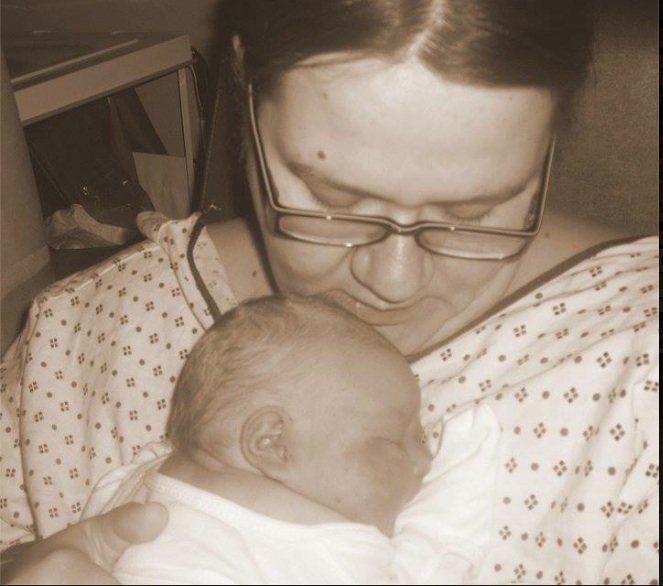
Kristine And Cora McCormick
I became a mother on Easter Sunday, 2009 when I saw the positive pregnancy test. That test and little baby growing in my belly ended up being my first and only child, Cora. She was born November 2009, and died five days later of an undetected congenital heart defect.
Are you a stay-at-home mom or do you work? I work at home. I work for an outside company doing things like data entry and customer support. I also write for several blogs and occasionally people even pay me to do that.
Why do you blog/write? I’m one of those people born with a writer’s genes. I remember when I was around 8 or 9 years old staying up with a goal of writing a certain amount of stories before the ball dropped on New Year’s Eve, while most children my age were running around throwing confetti, I was writing away. I write now because it is part of whom I am. My writing on advocacy issues and making the world a better place, all strive from my desire to remember and honor my daughter. I’m deeply interested in writing about child health, especially newborn health around the world.
How would you say that you are different from other mothers? I’m a childless mother, because my child is not here. I feel like a mother, but I have no child here with me. I mother her quite differently. I help pass laws in her name to save other babies. I share her story. I spill tears over missing her, and not tears over her being frustrating.
What do you view as the challenges of raising a child in today’s world? With my experience, I dove into reading about children around the world. For me, the biggest challenge is keeping a child alive and healthy. While here in the United States, many of my fellow mothers don’t have to really worry about that, I can relate to moms in other countries, where getting enough food to keep their child alive is a daily struggle. Of course, I don’t write that to take away from their struggle or pretend to know what it feels like. However, I know what it feels like when your child dies something that might have been prevented.
How did you find World Moms Blog? I’ve known about World Moms Blog since I’ve entered the advocacy world because of all of the amazing work the writers here do in sharing their stories and the stories of moms and children around the globe. I don’t remember the day I found you, but am sure glad I did.
We sure are glad you did too!
This interview of Kristine Brite McCormick of www.Corasstory.com is an original post written for World Moms Blog.
Kristine Brite McCormick is a fierce advocate for newborn health and safety. She entered this world of fighting for the lives of babies unwillingly when her daughter Cora died of an undetected congenital heart defect. She lives in Indiana, USA, with her husband and three dogs.
More Posts - Website
Follow Me:




by Kyla P'an (Portugal) | Mar 24, 2014 | 2014, Awareness, Being Thankful, Childhood, Education, Eye on Culture, Family, Feminism, Inspirational, Language, Life Lesson, Parenting, Preschool, Relationships, USA, Womanhood, Women's Rights, World Mom Feature, World Moms Blog, World Motherhood, Younger Children
 From almost the moment our daughter came onto the scene eight years ago, we knew she had a strong personality. She was one of those incredibly alert and determined babies; the type you could tell was processing her surroundings and trying to figure out what to do about them.
From almost the moment our daughter came onto the scene eight years ago, we knew she had a strong personality. She was one of those incredibly alert and determined babies; the type you could tell was processing her surroundings and trying to figure out what to do about them.
While many babies and toddlers her age were delighted to be pushed in a swing, my daughter would have nothing to do with swings until she was old enough to figure out what made them go. She had no desire to be the passive recipient of being pushed, instead she wanted to be in control; she wanted to conquer it. She took the same approach with toys, puzzles and games. She was an early walker, a determined eater, and an all-around intense little thing.
My husband and I frequently got comments like: “boy, you’ve got your hands full with that one,” or “she’s going to keep you on your toes.”
As our daughter grew, by far her favorite activities involved sorting, organizing and problem solving. I have one vivid memory of her toddler music class, when she was just two years old. About three-quarters of the way through the class, the teacher put out a basket of instruments for the children to choose from and play along with. Our daughter, who was particularly fond of the little plastic eggs filled with beans—which she called shake-a’s—was determined to collect as many of them as possible. Driven by this singular motive, she went around the room delivering alternate instruments to fellow toddlers and parents alike. Anytime she encountered an individual who already had a shake-a, she’d attempt to persuade them with an alternate instrument in exchange until she had gathered a significant cache.
During these displays of self-assured behavior and go-get-‘em spirit, I often found myself shrinking into the background, hoping other parents wouldn’t fault me for having such a pushy, precocious child. At this particular music class, however, a parent approached me afterwards and commended me for having such a “strong child with clear leadership potential.” With her few words of encouragement, this parent liberated me from my deep mommy guilt about having a child with drive.
I was in constant conflict because, even though I am a child of the 70’s—a time when many of our mothers here in the US were breaking down stereotypes and entering the workforce en masse—I was raised by my father, who came from an old-world upbringing and had old-fashioned views of how boys and girls should behave.
I am reluctant to admit that, rather than celebrating my daughter’s inherent leadership qualities, I labeled her as “bossy” and occasionally even criticized her for being too demonstrative.
Bossy, a word inferring that someone is behaving “boss-like,” should be a compliment heralding someone’s leadership skills but ironically, instead it criticizes her for it. It’s a label reserved primarily for girls. You rarely hear it applied to boys. A little girl on the playground, organizing kids into teams and assigning them roles will quickly be knocked down a few rungs by calling her “bossy,” whereas a little boy taking the same actions might be respected and followed.
I’m ashamed to admit, even I supported this stereotype. I was concerned my daughter was too confident interacting with adults, leading activities and organizing groups. I was concerned she wasn’t “girly” enough, lacked empathy and a gentle, nurturing-side. As a modern, liberated and independent woman myself, I still didn’t want her peers to ostracize her or put her down.
Why was I struggling between nurturing and diminishing my daughter’s inner boss? Why was I uncomfortable with her being a leader, or overly-confident or intensely goal oriented? What could I do to help raise this new generation of girl-leaders?
Two weeks ago I got some reassuring answers. They were in the Wall Street Journal, on a full-page, front-of-section article titled, “Don’t Call Us Bossy.” And the women giving the encouragement were the Chief Operating Officer of Facebook, Sheryl Sandberg, and the Chief Executive Officer of Girl Scouts, USA, Anna Maria Chavez.
Sandberg and Chavez’s goal is to redirect our thinking about the way girls lead. To relabel our vocabulary about girls’ take-charge behavior. Instead of bossy behavior, recognize it as executive leadership potential, like CBS television anchor, Norah O’Donnell does. Instead of discouraging ambitious goals, support girls to recognize their inherent ability to achieve whatever goal they set out for.
I think the world would be a very different—and frankly far more pleasant—place to live in if there were more “bossy” women in charge.
Let’s take a stand to have more female bosses in the workplace; Here’s to raising our girls to be the leaders they are capable of being, not the followers our lexicon makes them feel they are supposed to be!
Did anyone ever call you “bossy” growing up? Do you see these qualities in your own child? How do you feel about assertive and confident girls?
For ways to encourage leadership in girls, visit LeanIn.org and BanBossy two of the movements supported by Sheryl Sandberg, Ana Maria Chavez and Girl Scouts, USA.
This is an original post to World Moms Blog from our managing editor and mother of two, Kyla P’an.
The image used in this post is credited to Pat Moore. It holds a Flickr Creative Commons attribution license.
Kyla was born in suburban Philadelphia but spent most of her time growing up in New England. She took her first big, solo-trip at age 14, when she traveled to visit a friend on a small Greek island. Since then, travels have included: three months on the European rails, three years studying and working in Japan, and nine months taking the slow route back from Japan to the US when she was done. In addition to her work as Managing Editor of World Moms Network, Kyla is a freelance writer, copy editor, recovering triathlete and occasional blogger. Until recently, she and her husband resided outside of Boston, Massachusetts, where they were raising two spunky kids, two frisky cats, a snail, a fish and a snake. They now live outside of Lisbon, Portugal with two spunky teens and three frisky cats. You can read more about Kyla’s outlook on the world and parenting on her personal blogs, Growing Muses And Muses Where We Go
More Posts - Website
Follow Me:


by Jennifer Burden | Mar 22, 2014 | 2014
“Water, water everywhere and not a drop to drink.”
Growing up only a few miles from the Atlantic Ocean, I have always felt a large connection with water. I spent my time growing up splashing in the waves, even skipping high school to ride my bike and bodyboard down to the beach to catch some waves. The ocean was always my place to go to de-stress, whether it was running the boardwalk in high school cross country practices, walking the boardwalk while talking with my mom, or running on the beach to feel alive.
I’ve always lived where there was plenty of fresh water to drink and bathe in, too, but can you imagine not having enough desalinated water to drink? Or no access to a toilet? This is the reality for so many of us across the planet. Did you know that 2.5 billion, or 1 in 3 people in the world do not have access to a toilet according to CNN?
When I was in Uganda with the UN Foundation’s Shot@Life campaign in October 2012, I witnessed many people walking on the roads long distances with large yellow water jugs to collect clean water for their homes.
Here is an example of people near Queen Elizabeth National Park in Fort Portal, Uganda using the lake to wash their clothes. Mind you, it is a crocodile-ridden lake, so their safety was at risk.
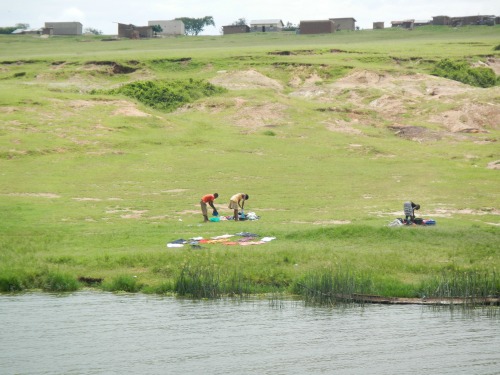
Another two-some carried water in the yellow jugs from the lake to their homes.
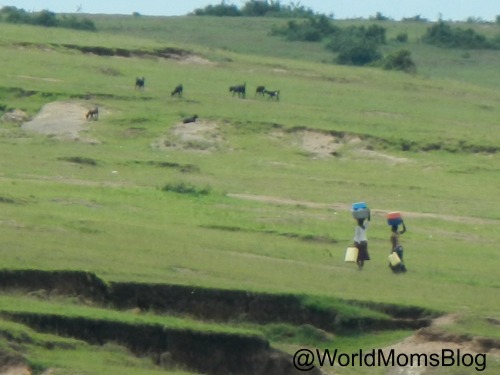
Also, here is a water pump that was installed at a boarding school we visited in western Uganda. The school installed a rain collection system on the roofs of all of the buildings, which fed into this water pump because there is no running water there.
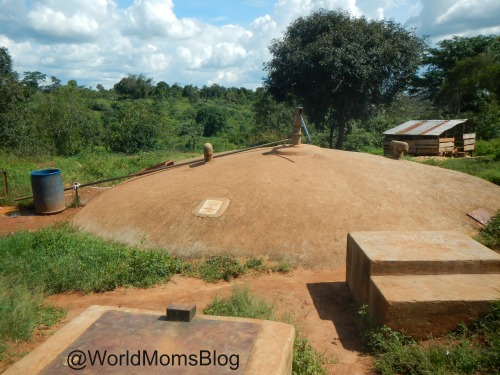
At Railway Children Primary School in Kampala, we found an example of a water tower. The cachement area for this school are the capital’s slums, and it is highly funded by UNICEF Uganda. This water tower makes it possible for the children to wash their hands after they use the toilets, which were then just newly installed.
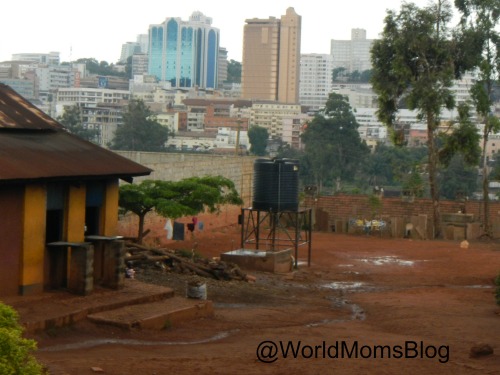
Here is the area for the toilets:
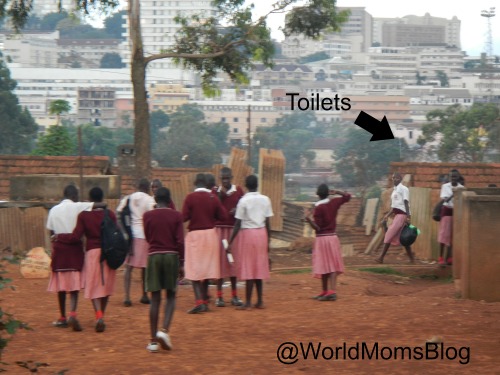
Today, March 22nd, 2014, is World Water Day. Water is a basic need, a human right. There are organizations, such as Wateraid, working year-round to help provide toilets and clean water to people around the globe. Think of them next time you donate. And think of the people at this very moment who are looking for a place to “go.”
This is an original post to World Moms Blog by founder, Jennifer Burden, in New Jersey, USA.
Photo credits to the author.

Jennifer Burden is the Founder and CEO of World Moms Network, an award winning website on global motherhood, culture, human rights and social good. World Moms Network writes from over 30 countries, has over 70 contributors and was listed by Forbes as one of the “Best 100 Websites for Women”, named a “must read” by The New York Times, and was recommended by The Times of India.
She was also invited to Uganda to view UNICEF’s family health programs with Shot@Life and was previously named a “Global Influencer Fellow” and “Social Media Fellow” by the UN Foundation. Jennifer was invited to the White House twice, including as a nominated "Changemaker" for the State of the World Women Summit. She also participated in the One Campaign’s first AYA Summit on the topic of women and girl empowerment and organized and spoke on an international panel at the World Bank in Washington, DC on the importance of a universal education for all girls. Her writing has been featured by Baby Center, Huffington Post, ONE.org, the UN Foundation’s Shot@Life, and The Gates Foundation’s “Impatient Optimists.” She is currently a candidate in Columbia University's School of International and Public Affairs in the Executive Masters of Public Affairs program, where she hopes to further her study of global policies affecting women and girls.
Jennifer can be found on Twitter @JenniferBurden.
More Posts - Website
Follow Me:





 “Hey bro, vipi? How much for these shoes?” I ask the second-hand market vendor.
“Hey bro, vipi? How much for these shoes?” I ask the second-hand market vendor.



















